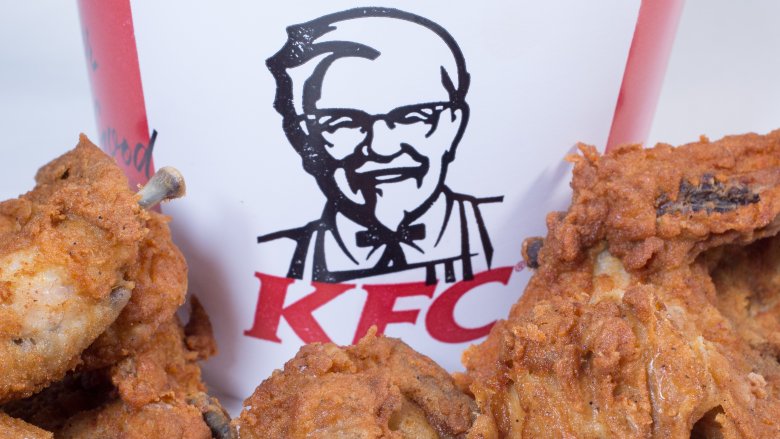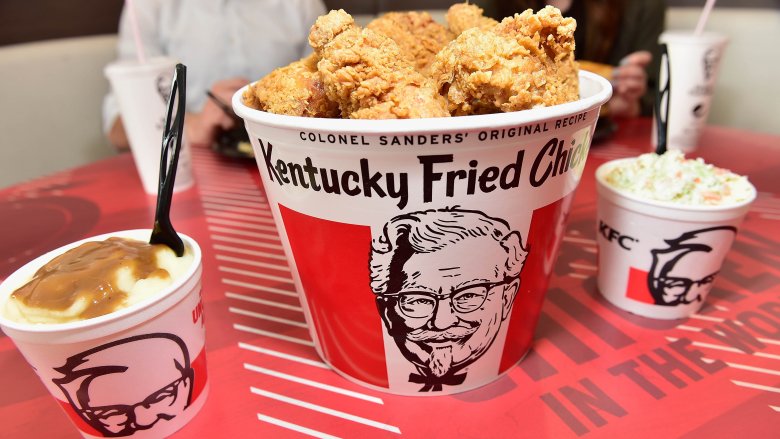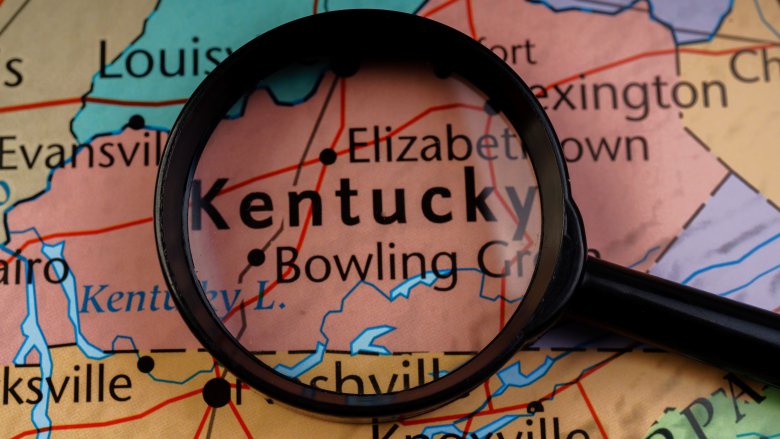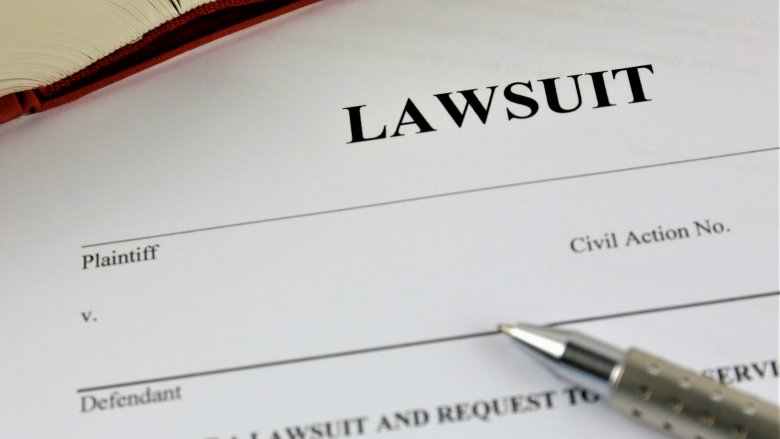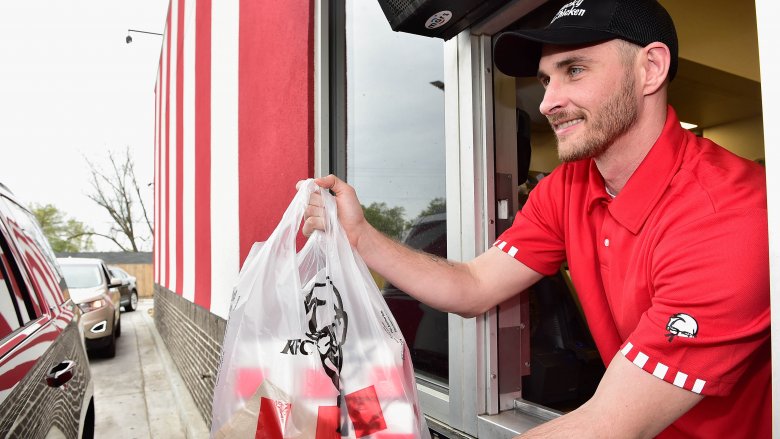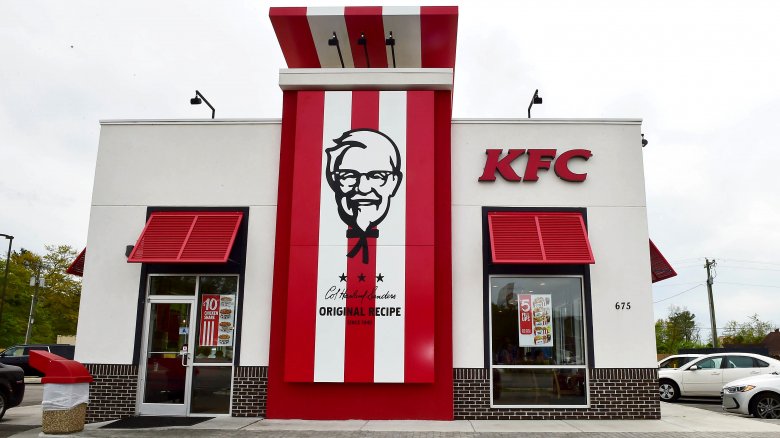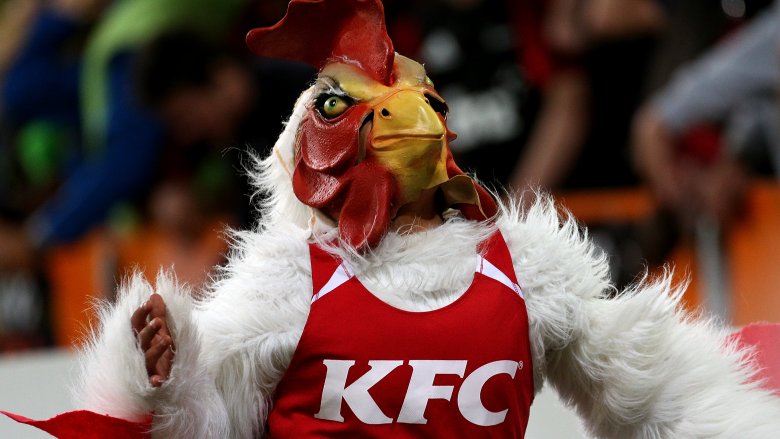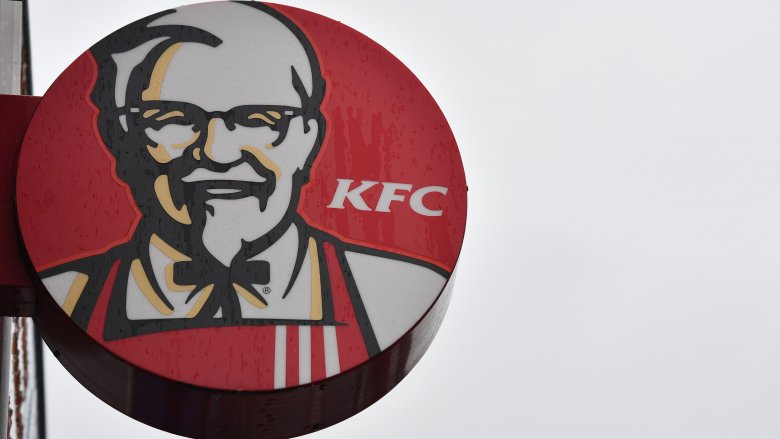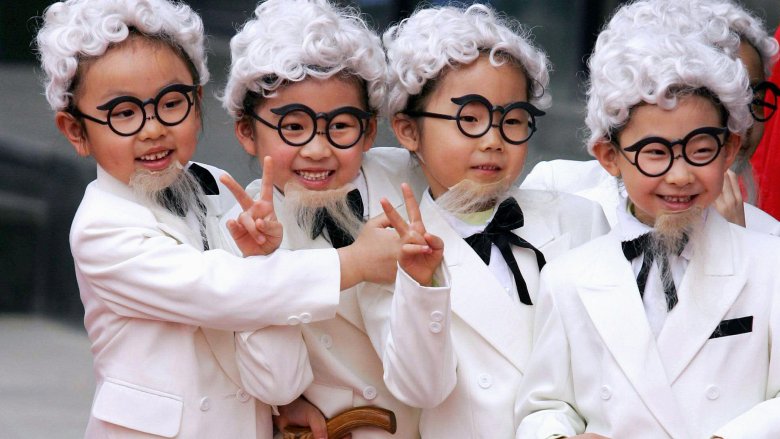The Real Reason Why KFC Changed Their Name
It's no secret that running a business is tough. Reputation and name recognition are everything, and let's say you've worked for decades getting people to say one thing: Kentucky Fried Chicken. Then, in 1991, you change your name to KFC. Why on earth would a business do that?
They admit themselves that they weren't incredibly clear on why they opted for the change, which some people thought was a really strange thing to do. That gave rise to all kinds of rumors, and those rumors spread faster and farther than the truth.
What is the truth, anyway? It's actually stranger than you think, and we'll have to add this: Technically, KFC still is Kentucky Fried Chicken, and they still own the name as a registered trademark. But along the way, things got complicated. It's absolutely not for the reason you expect, and the irony is that if they had gone with their first choice, none of this ever would have happened. Probably.
No, it wasn't to remove the word fried
First, let's talk about the elephant in the room and that rumor that everyone's heard: They wanted to get rid of the word "fried" so health-conscious customers wouldn't automatically think of artery-clogging fats when they thought of the chicken chain.
Strangely, this is a rumor that started with KFC themselves. According to Snopes, that actually was the official statement released by the chain's public relations people. They claimed that they really did offer some "healthy" menu items and were making a swing toward being more health-conscious, and wanted everyone to know that. Most importantly (the story goes), they wanted people to know it and come back to them.
It sounds like a legitimate reason for rebranding, right?
But it definitely wasn't the whole truth, and it was sort of a double-edged sword. KFC was, after all, still fried, so trying to hide the word "fried" behind an "F" wasn't really fooling anyone, was it? It was actually just a story, and the real story was even stranger.
They didn't want to pay to use their name
In 1990 — the year before KFC rebranded — the state of Kentucky did a weird thing. Snopes says the more officially-named Commonwealth of Kentucky was looking to get rid of some of their state debt, so someone struck on an idea that was equal parts brilliant, bizarre, and completely alienating. They decided to trademark their name, so anyone using the word "Kentucky" for any commercial reason would need to pay the state a licensing fee.
The then-Kentucky Fried Chicken chain spent a year negotiating with the state, basically saying it was pretty insane to make them pay a fee to use a name they had trademarked and had been using for decades. We all know how it turned out: Kentucky Fried Chicken became KFC, and they took the opportunity to introduce the name change along with a complete redesign of their packaging and image.
Strange? Absolutely.
There really have been lawsuits over Kentucky
Snopes says that it wasn't just Kentucky Fried Chicken that struggled with their name. It's why nurseries were suddenly selling "Shenandoah bluegrass" instead of "Kentucky bluegrass," and it's why you suddenly stopped hearing Neil Diamond's "Kentucky Woman" on the radio. They add that KFC and Kentucky settled the issue in 2006, and it was agreed that KFC could keep using their original name.
But fast forward a bit to 2016, and you'll find the issue isn't over. This time, it was the University of Kentucky who hopped on the crazy-trademark bandwagon, and they claimed they were the ones who owned the word "Kentucky" (via Free Advice Legal)... at least, when it came to clothing. With more than 400 businesses using the word in trademarks or trademark applications, it might seem as though they were fighting an uphill battle. But they decided to fight it anyway.
They first clashed with a distillery called Kentucky Mist Moonshine, and shockingly, when the distillery took them to court to argue there was no mistaking them with the university and they should be allowed to make merch with their name on it, the Lexington Herald Leader reported the judge threw out the case... in favor of the university. Could that be part of the reason KFC remains KFC?
KFC was already popular anyway
Switching from "Kentucky Fried Chicken" to "KFC" wasn't a huge stretch, and KFC has said as much. They've even admitted that it's probably a better name anyway, saying: "Maybe because KFC is just easier to say with your mouth full." They give a few other tongue-in-cheek explanations, too, saying that it fits better on signs, and there were fewer syllables. They also didn't want people to think of them as just a place to go for chicken, because they have other stuff, too. And that seems more of a justification than a reason, doesn't it?
But they do bring up a super important point: People were already calling them KFC. They had been KFC to a lot of people for a long time, and when that's the case, it makes switching that much easier.
The Harvard Business Review stresses that it's not something they're alone in doing. Many businesses have shortened their names to their acronyms. There's NPR, the YMCA, AARP, and BP, for example, and hey, at least they weren't Wisconsin. The Wisconsin Tourism Federation had to change their entire name after using their acronym — WTF — for long enough.
It was almost named after a different state
It's strange, how things happen sometimes. If you look back through KFC's history, you'll see that the first restaurant that Colonel Sanders opened wasn't in Kentucky at all — it was in Salt Lake City, Utah.
In 1952, Deseret News says Sanders headed to Utah to meet up with a man he'd previously met at the National Restaurant Association. That man — Leon W. "Pete" Harman — owned the Harman Cafe in Salt Lake City and, at the time, Sanders owned his Sanders Cafe. Sanders ended up cooking fried chicken for the Harmans, and Harman put it on the menu in his cafe. He then hired a sign painter named Don Anderson to paint something in the windows to advertise the new addition, and what got painted there was Anderson's idea: Kentucky Fried Chicken.
Sanders passed through again two weeks later, saw the sign, and the rest is history.
But it was almost very different. At first, Deseret News says they had considered calling it "Utah Fried Chicken" because, well, they were in Utah. They settled on Kentucky because it cultivated an image of friendly southern hospitality, which is kind of ironic considering all the kerfuffle the name would cause decades later.
No, it had nothing to do with mutant chickens
There was one more rumor going around regarding the KFC name change that warrants discussion, and that's the one that says "chicken" was the word they weren't allowed to say. KFC says that's particularly ridiculous, and confirms that they're definitely allowed to describe their product as chicken because it's definitely chicken.
Snopes says the name change was partnered with the weird rumor that KFC was actually breeding mutant chickens with four, six, or eight legs to supply all the meat needed for their restaurants. That's disturbing on so many levels, but it turns out that the rumor had more legs than KFC's supposed mutant birds.
KFC has been fighting the rumor on a global scale, with international divisions like those in Canada and the UK repeating that it's a completely insane rumor with no basis in fact whatsoever. And they've been saying it for a long, long time — at least since the name change happened in the '90s. Isn't it about time the rumor went the way of other less-than-stellar '90s memories?
Why do we believe all these fake stories?
So, here's a question: How did all these rumors get started in the first place? The same place as many rumors — the internet.
KFC Canada traced the rumor to one specific chain email — remember those? The email had a bit of a legitimate tone to it, claiming to be sharing the findings of a study carried out by the University of New Hampshire. The study, it was claimed, had found that KFC was actually using "genetically manipulated organisms" kept alive only with the help of tubes and pumps that circulated blood throughout their bodies. It was further claimed these mutant chickens had no feathers, feet, or beaks (to save on the cost of removing them), and that their bone structure had been shrunk so they would produce more meat.
It further claimed that the government had gotten involved and made them take "chicken" off the menu. But it makes no actual sense. How is any of that cheaper than raising actual chickens? Why would the government have allowed them to continue their mutant chicken factories? How would this be the subject of a university research project? But we believed it, back in the early days of the internet. We're wiser now, aren't we?
They were willing to pay someone to use their name... sort of
In spite of all their naming woes, KFC is still happy to have a little fun with another name: Harland. The moniker of Colonel Sanders has never been super popular, and according to The Atlantic, there were only 155 born in the same year as the Colonel himself. (That was 1918, if anyone's keeping track).
In an attempt to raise the profile of the name, KFC announced a contest in 2018. The first baby born on September 9 (the Colonel's birthday) and named Harland would get a cool $11,000 (in honor of the name and "KFC's 11 herbs and spices") toward the little tyke's college education.
Did anyone win? Of course! The Courier Journal reported on the birth of little Harland Rose, an 8-pound, 1-ounce baby girl born on the Colonel's birthday. They got the money, and that little girl? She got a super-adorable name, and her parents were already calling her Harley.
